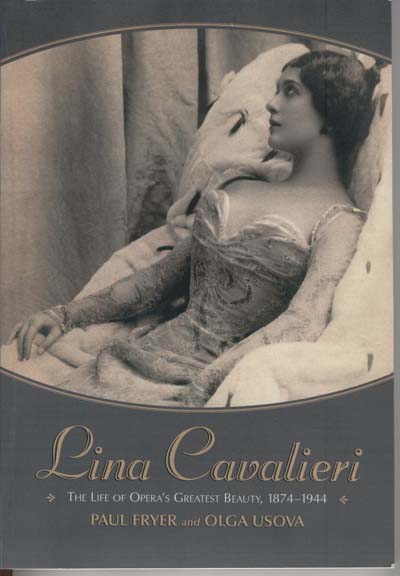


Lina Cavalieri
By Paul Fryer and Olga Usova
200 pp
John Charles Thomas
By Michael J. Maher
224 pp
McFarland Publishers is establishing itself as one of the most interesting US publishing houses for books about music and singers. A great addition to their catalogue is a book written by Paul Fryer and Olga Usova on self-proclaimed beauty queen and soprano Lina Cavaleri.
This is the first English language biography of this cabaret performer, courtesan and international operatic diva. Paul Fryer has written this book with the assistance of Olga Usova, who took great care in researching Russian archive sources. The 200 pages contain many previously unpublished photographs, period reviews and memorabilia. There is also a filmography, discography and a selective chronology of stage performances.
In spite of an incomplete discography and several typos, Stracciari is Stacciari for example, Fryer and Usova give us all there is to know about this controversial diva’s artistic career, notorious love affairs and failed marriages.
Equally enjoyable and equally welcome, though not faultless either, is a book on the great American baritone John Charles Thomas by Baltimore based historian Michael J. Maher.
A few of his statements throughout the narrative are a bit bizarre. He claims, for example, that Bidu Sayao, Helen Jepson and Richard Crooks belonged to the “French wing” operating at the Met. Maher, as a historian, also should have known better than to put everything in French when discussing the Munt (Monnaie) and thus giving the impression that Brussels is solely a French speaking city.
For the record, Belgium is not a French speaking country. More than half of its population speaks Dutch and in Brussels, especially at the time of Thomas’ appearances, there was a Dutch speaking majority. Equally annoying is his constant use of Holland instead of the more correct The Netherlands. Maher gives us quite a lot of information on Adelin Fermin, one of Thomas’ teachers, who apparently was a former Dutch baritone. According to Maher, Fermin made his operatic debut in Antwerp and also sang in The Hague. I was intrigued by this information but several hours of research on my part couldn’t produce a single trace of the ‘fine baritone voiced’ teacher as an opera singer in either Antwerp or the Netherlands. Also, when discussing Léhar’s operettas Maher should have given us the original language title also. I mean it took me some time to realise “Alone at Last” was in fact an earlier version of “Schoen ist die Welt.”
There are also a few typos which perhaps more careful editing would have corrected. Some examples- Il Trovatrore (pg.141), Sollenne in quest ora (pg.167) , Barbiere de Siviglia (pg. 171), cen est fait (pg.172), Pecheurs de Pperles (pg.177), Reggianni (pg. 182) etc.
I found it strange that the live broadcast excerpts of the Chicago Falstaff (1941) weren’t mentioned or discussed since Thomas was such a superb English-language Falstaff in spite of an apparent decline in his vocal powers.
Otherwise the book is wonderfully researched. It not only gives us many insights into Thomas’ life and career but also into musical life in the States during Thomas’s lifetime. Maher manages to give a concise and fascinating account of it all. Wonderful and rare illustrations abound and these alone would make the book a worthwhile purchase. In spite of some minor quibbles both the Cavalieri book and especially the John Charles Thomas biography are more than welcome additions to one’s music books library.